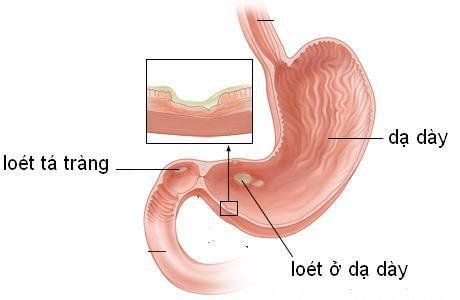Vomiting is a forceful expulsion of the stomach's contents. While nausea can occur at any time of day, certain conditions may make it more likely to happen at night. Read on to learn more about the causes of nighttime nausea, when to see a doctor, treatment options, and home remedies to help alleviate symptoms.
1. What is vomiting?
Vomiting is a forceful expulsion of the stomach's contents. Nausea can occur at any time of day. However, certain conditions can make you more prone to nausea at night. Read on to learn more about the causes of nighttime nausea, when to see a doctor, treatment options, and ways to help reduce nausea at home.
2. Complications of vomiting
Dehydration is the most common complication associated with vomiting. Vomiting causes your stomach to empty not only food but also fluids.
Dehydration can cause:
-Dry mouth
-Fatigue
-Dark urine
-Decreased urination
-Headache
-Confusion
Dehydration is especially serious in infants and young children who vomit. Younger children have smaller body mass and therefore less fluid to sustain themselves. Parents of children who exhibit signs of dehydration should talk to their pediatrician right away.
Malnutrition is another complication of vomiting. Not being able to keep down solid food causes the body to lose nutrients. If you are feeling excessively tired and weak in relation to frequent vomiting, seek medical attention.

3. Possible causes of nighttime nausea
Possible causes of nighttime nausea include the following conditions:
3.1. Anxiety
Anxiety includes feelings of worry and nervousness. It is normal to feel this way from time to time. Most people experience anxiety at some point or another.
However, if you have these feelings often or if your anxiety seems out of proportion to your current situation, you may have a condition called generalized anxiety disorder.
Whether you have daily anxiety or an anxiety disorder, anxiety can be worse at night. This may be because you have fewer distractions at night than during the day when you are busy with work, school, or family matters.
When your mind is not focused on other things, you are more likely to focus on your worries or problems.
All types of anxiety can cause digestive problems, including nausea. Since anxiety can be worse at night, you may also experience nausea at night.
Other symptoms of anxiety include:
- Restlessness
- Difficulty concentrating
- Increased heart rate
- Panic attacks
- Sweating
- Difficulty sleeping
- Difficulty thinking about anything other than what is causing your anxiety
3.2. GERD – Gastroesophageal reflux disease
Gastroesophageal reflux disease (GERD) is a condition in which stomach acid backs up into your esophagus. It is also called acid reflux. GERD happens when the band of muscle between your esophagus and stomach doesn't close tightly or completely. This allows the digestive juices in your stomach to move up into your esophagus.
The most common symptom of GERD or acid reflux is heartburn – a burning sensation in your chest. You may also notice a sour taste in the back of your mouth. Nausea may also accompany these symptoms.
Other symptoms of GERD include:
- Difficulty swallowing
- Feeling like there is something stuck in your throat
- Dry cough
- Pain in your chest or upper abdomen
- Vomiting
- Asthma
Eating late at night can worsen GERD symptoms, including nausea. This is because lying down, especially after a large meal, makes it easier for acid to back up into your esophagus.
3.3. Drug side effects
Nausea is a common side effect of many medications, especially:
- Antibiotics
- Aspirin
- Nonsteroidal anti-inflammatory drugs (NSAIDs)
- Some types of blood pressure medication
If you take your medication at night, you may experience more nausea at night. Other symptoms or side effects will depend on the type of medication.
3.4. Peptic ulcer
A peptic ulcer is a sore on the lining of your stomach or small intestine. The bacteria H. pylori can cause these ulcers.
The most common symptom is pain between your breastbone and belly button. Other symptoms include:
- Nausea
- Belching
- Feeling full after eating a small amount of food
- Vomiting
- Black or bloody stools
- Unexplained weight loss
- These symptoms often become worse after eating and at night.
Peptic ulcer is a cause of nighttime nausea.

3.4. Pregnancy
Nausea is a very common symptom during pregnancy. While nausea during pregnancy is often called morning sickness, it can occur at any time of the day.
The increase in hormones causes nausea during pregnancy. It usually starts around the 6th week and ends around the 12th week of pregnancy. It is not dangerous for you or your baby, unless you cannot keep any food down.
3.5. Gastroparesis
Another possible cause of nighttime nausea is gastroparesis. This is a condition where the stomach doesn't empty itself of food as it should. It is most common in people with diabetes. Other causes include:
Infection
Surgery
Scleroderma
Opiates
Certain antidepressants
Gastroparesis can also occur due to damage to the vagus nerve, which helps the stomach muscles contract to move food along. Symptoms can be worse at night because food you eat during the day can build up in your stomach.
Symptoms of gastroparesis include:
Nausea
Heartburn
Vomiting
Feeling full after eating a small amount of food
Bloating
Weight loss
3.6. Cyclic vomiting syndrome
Although less common, cyclic vomiting syndrome is another cause of nighttime nausea that can affect both adults and children. This is a rare disorder that causes 1 repeated severe episodes of nausea and vomiting.
These episodes can last for several hours or days. Most people have episodes that are about the same length each time. Between episodes of nausea and vomiting, you feel healthy.
In addition to nausea and vomiting, symptoms may include:
- Pale skin
- Fainting
- Dizziness
- Headache
- Stomach pain
- Exhaustion and anxiety are both triggers of cyclic vomiting syndrome and both are more common at night. This can make cyclic vomiting syndrome more likely to flare up at night.
4. When should you see a doctor?
In many cases, feeling nauseous is only temporary and will go away on its own. But it can also be a sign of a more serious problem. See a doctor if:
Your feeling of nausea lasts more than a week
You always feel nauseous after eating
Your nausea leads to severe headaches with vomiting
You have unexplained weight loss
Nausea and vomiting continue to recur for at least 1 month
You cannot keep any food down, especially if you are pregnant
You are feeling: Confused, blurry vision, severe abdominal pain
5. Treatments
Treatment for nighttime nausea will depend on the underlying cause.
5.1. Anxiety-related nausea
One of the most effective treatments for anxiety is psychotherapy, especially cognitive behavioral therapy, also known as CBT.
This type of therapy helps you identify negative or destructive thought patterns. Once you recognize these patterns, you can begin to learn how to reframe your thinking in a more positive way.
Other treatment options for anxiety include:
Anti-anxiety medication
Lifestyle changes, such as exercise and reducing caffeine and alcohol intake
5.2. Treatment for GERD-related nausea
The most common treatment options for GERD include:
Antacids
H2 blockers, which reduce acid production (both over-the-counter and prescription)
Medications called proton pump inhibitors, which are stronger acid reducers (both over-the-counter and prescription)
Surgery, if medications do not help
Lifestyle changes, such as avoiding spicy foods, not eating late at night, eating smaller meals, and limiting alcohol and caffeine
5.3. Treatment for medication-induced nausea
If your prescription medication is causing nausea, talk to your doctor about switching medications or taking the medication at a different time of day to reduce nausea and other side effects. You may also need to take medication with food or water.
It is important that you do not stop taking your medication on your own. Always talk to your doctor about the best way to change your medication or how you take it.
If over-the-counter medication 1 is making you nauseous, try using a different type such as ibuprofen instead of naproxen.
5.4. Treatment for nausea caused by peptic ulcers
The most common treatment options for peptic ulcers include:
Antibiotics to eliminate the bacteria H. pylori
Antacids, H2 blockers, or proton pump inhibitors to reduce stomach acid
Medications to protect the lining of your stomach
Lifestyle changes, such as quitting smoking and avoiding foods that worsen your symptoms
5.5. Treatment for nausea caused by gastroparesis
Treatments for gastroparesis typically include:
Medications to help your stomach muscles move normally
Surgery
Lifestyle changes, such as eating smaller, more frequent meals and eating foods that are easy to digest
5.6. Cyclic vomiting syndrome
Treatment for cyclic vomiting syndrome may include:
Anti-seizure medications
Anti-nausea medications
Migraine prevention treatments
Rehydration therapy; if it is severe, you may need to be treated in a hospital with intravenous fluids
6. Home remedies
You can take steps to reduce the severity of nausea at home. If your nausea lasts for more than a week or if it gets worse, you should see a doctor.
The following self-care measures may help to reduce nausea:
Elevate your head so that you are not lying flat in bed. If you are comfortable, try to sleep with your head elevated about 12 inches higher than your feet. This may help keep acid or food from moving up into your esophagus.
Sip small amounts of clear, slightly sweet liquids, such as fruit juice, but avoid citrus fruits. Sip slowly. Increase the amount as you begin to feel better.
Drink ginger tea or peppermint tea.
Suck on peppermint candies.
Eat small amounts of bland, dry foods such as crackers or toast.
Avoid physical activity until you feel better, but try to avoid lying down.
Nausea at night is often a symptom of an underlying condition. Some of the most common causes include acid reflux, anxiety, medication side effects, peptic ulcers, or pregnancy.
Nighttime nausea is often treatable with self-care or a visit to the doctor.
If your nausea is severe or prolonged, or if you have severe headaches or unexplained weight loss along with nighttime nausea, see a doctor. They can diagnose the cause of your nausea and work with you to find the appropriate treatment.
To arrange an appointment, please call HOTLINE or make your reservation directly HERE. You may also download the MyVinmec app to schedule appointments faster and manage your reservations more conveniently.
Articles refer to sources: rarediseases.org, my.clevelandclinic.org, mayoclinic.org














